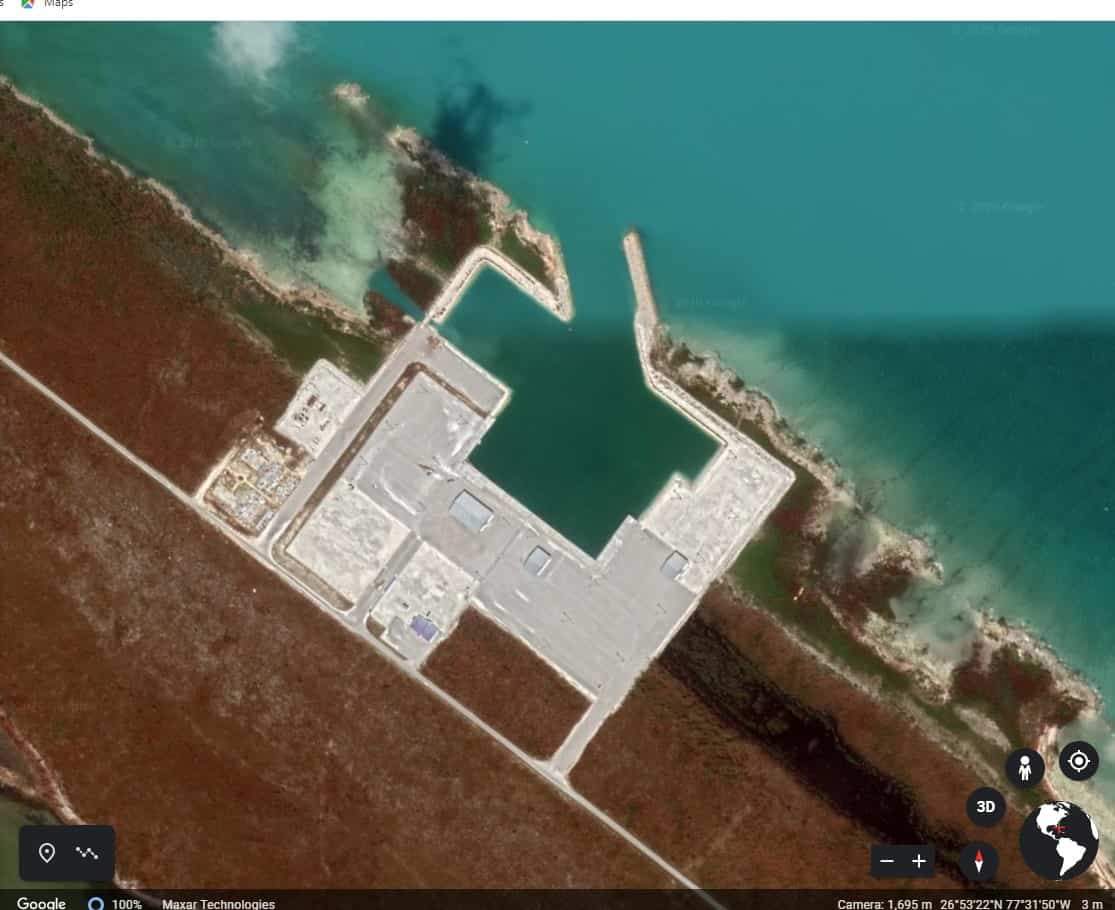Communist China's long term three-fold agenda with the Bahamas:

Photo: North Abaco sea port, with help from China (Google Earth)
By Joy Votrobek, Sr. Research Analyst, American Security Council Foundation.
May 12, 2020 - Communist China's long-term three-fold agenda with the Bahamas
- Bahama's recognition of "one-China" ending their diplomatic relations with Taiwan.
- Economic coercion through loans for gambling casinos and infrastructure
- Chinese operate a deepwater port close to U.S. Navy submarine testing waters and U.S. Space activities at Cape Canaveral.
For a more in-depth report and timeline, please refer to An In-Depth Look at China's Footprint in the Bahamas.
China's worldwide efforts to isolate independent Taiwan through political and economic coercion succeeded in the Bahamas in 1997. The Bahamas terminated diplomatic ties with Taiwan and recognized Beijing's "one-China" policy. That same year, Hong Kong's Hutchinson Whampoa, with links to Beijing, poured $2.6 billion into the Freeport Container Port. A large port that Hutchinson Whampoa currently manages. Freeport is located on Grand Bahama Island.
Furthermore, in 2009, China's Shandong Hi Company started construction of the Thomas Robinson stadium. Bahamian officials told the New York Times that the $30 million "gifted" stadium was in part due to ending their diplomatic ties with Taiwan. North Abaco port (pictured above) is located on the Abaco Island chain, approximately 66 nautical miles west of Freeport. The Chinese also financed and built it, but the Bahamian government put up part of the financing and now manages the North Abaco Port.
Ever since the Bahamas recognition of one-China, Chinese bankers and construction companies have been loaning money to the Bahamas for excessive infrastructure programs, including gambling casinos and resorts. Only the future will tell if the Bahamas will be prosperous or find themselves with underutilized infrastructure and gambling resorts that cannot generate the income to cover the loan costs. The Bahamas aren't alone. It has become China's approach to prey on nation-states needing infrastructure but lacking the financial ability to build within the budget or secure loans through Western capital markets. China has a pattern of going to the nation-state's aid, bearing "gifts" and loans.
Arguments arise over how much of a national security threat Chinese-operated Ports and resorts in the Bahamas are. Hutchinson Port Holdings control of 15% of the world's shipping, managing 52 ports in 27 countries, should be of concern because of their ties to Beijing and the PLA. Proximity to the U.S. and Beijing's desire to gain commercial fishing rights off Andros Island should not go unwatched. Andros Island is where the U.S. Military conducts nuclear submarine exercises. Andros is just 110 nautical miles from Freeport.
It doesn't seem coincidental that China wants the rights to commercial fishing off of Andros, primarily when the Chinese militia have been known to use commercial fishing boats as part of their naval military. Also, the U.S. nuclear submarine port and space center at Cape Canaveral is only approximately 154 nautical miles from Freeport, located on Grand Bahama Island, the easternmost island of the Bahama island chain and closest to Cape Canaveral. Hutchinson has already modernized Freeport; it may only be a matter of time before Freeport becomes a 5G smart port.
The Chinese are patient with a long term view, waiting for the right government to come into power to do their bidding. China's economic, political, and militarily strategic positioning in the Bahamas requires that the United States stay alert to China's threefold plan and take action where needed.
Hutchinson Ports.com Defense News. Chinese militia armed fishing boats. Seatrade Maritime (May 11, 2020)



